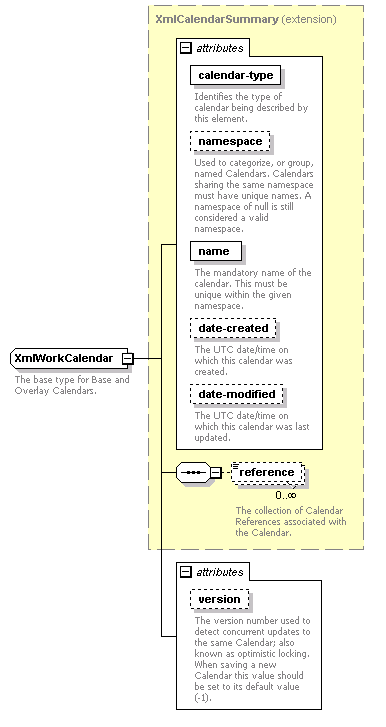| diagram |
 |
| namespace |
http://basic.api.dac.n2.tibco.com |
| type |
extension of XmlCalendarSummary |
| properties |
| base | XmlCalendarSummary | | abstract | true |
|
| children |
reference |
| used by |
| complexTypes | XmlBaseCalendar XmlOverlayCalendar |
|
| attributes |
| Name | Type | Use | Default | Fixed | Annotation | | calendar-type | XmlCalendarType | required | | | | documentation | | Identifies the type of calendar being described by this element. |
| | namespace | xs:string | optional | | | | documentation | | Used to categorize, or group, named Calendars. Calendars sharing the same namespace must have unique names. A namespace of null is still considered a valid namespace. |
| | name | xs:string | required | | | | documentation | | The mandatory name of the calendar. This must be unique within the given namespace. |
| | date-created | xs:dateTime | optional | | | | documentation | | The UTC date/time on which this calendar was created. |
| | date-modified | xs:dateTime | optional | | | | documentation | | The UTC date/time on which this calendar was last updated. |
| | version | XmlLockVersion | | -1 | | | documentation | | The version number used to detect concurrent updates to the same Calendar; also known as optimistic locking. When saving a new Calendar this value should be set to its default value (-1). |
|
|
| annotation |
| documentation | | The base type for Base and Overlay Calendars. |
|
| source |
<xs:complexType name="XmlWorkCalendar" abstract="true">
<xs:annotation>
<xs:documentation>The base type for Base and Overlay Calendars.</xs:documentation>
</xs:annotation>
<xs:complexContent>
<xs:extension base="XmlCalendarSummary">
<xs:attribute name="version" type="XmlLockVersion" default="-1">
<xs:annotation>
<xs:documentation>The version number used to detect concurrent updates to the same Calendar; also known as optimistic locking. When saving a new Calendar this value should be set to its default value (-1).</xs:documentation>
</xs:annotation>
</xs:attribute>
</xs:extension>
</xs:complexContent>
</xs:complexType> |
